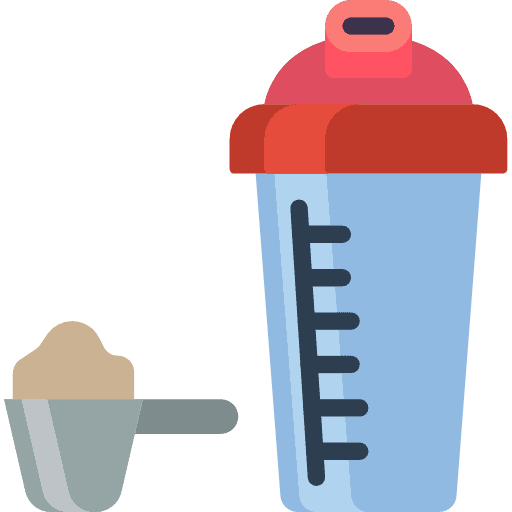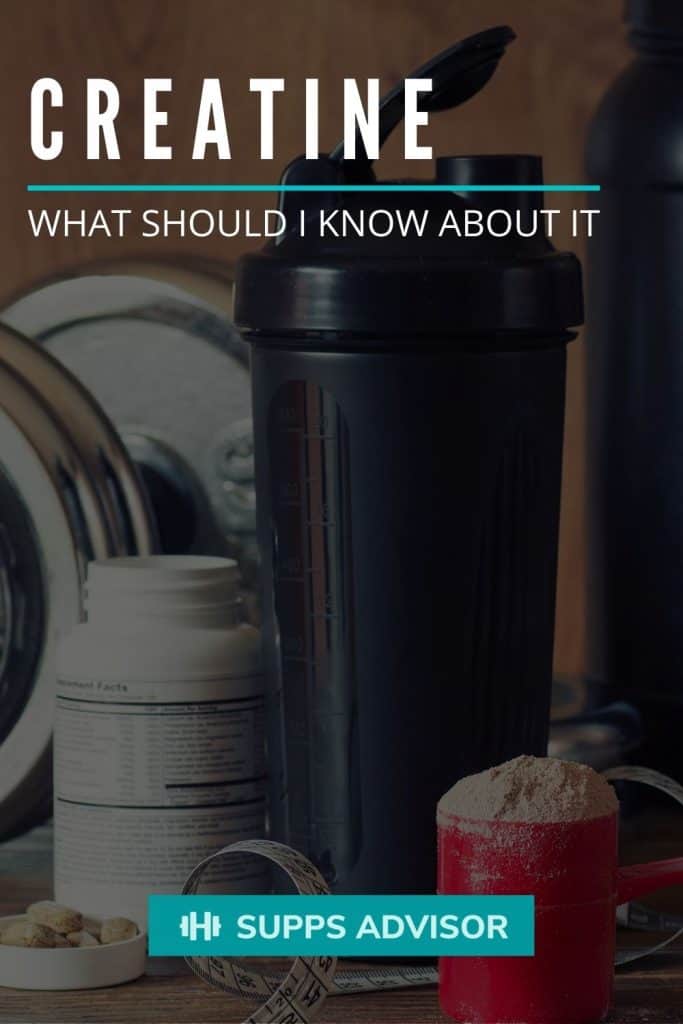TOC
Creatine – What Should I Know About It

02/06/2020 · 9 min reading
Many clients of mine have expressed concerns about their muscle growth and fatigue. Some of them had muscle fatigue that stopped their workout dead in its tracks. They would cut their strength training short and halt their progress. Other clients trained hard, but their progress was slow.
For both situations, my biggest recommendation was creatine. Not only is creatine used by pro athletes and bodybuilders, but it’s beneficial for everyone.
So let’s explore creatine benefits and everything about it!
Once it is taken, creatine turns into creatine phosphate. Creatine phosphate helps make adenosine biphosphate (ADP). ADP is essentially useless until it converts to adenosine triphosphate (ATP).
ATP is the main source of body fuel. It causes your muscles to contract and perform during exercise.
Approximately 95% of your creatine levels 6 are stored in your muscles. The rest is stored in your liver, kidneys, and brain. Increasing your creatine intake adds to the store in your muscles. During high-intensity training, the creatine in your muscles converts to ATP. This allows your muscles to stay energized and build up quicker.
Although creatine is produced in the body, it can also come from food and supplements. Creatine is very popular among gymgoers. This is especially true for weight lifters and pro athletes.

What Does Creatine Do?
Creatine and ATP work in several other ways.
Creatine boosts cell signaling, which promotes faster muscle recovery. It also allows the cells to keep more water for cell hydration 11.
Creatine also has different ways to boost muscle growth. The energy it provides slows the onset of muscle fatigue. Thus, your workouts can be longer or more intense. Creatine also reduces levels of a protein called myostatin. Myostatin sometimes slows muscle growth or stops it altogether.
Additionally, creatine increases the production of anabolic hormones 1. These hormones support new muscle growth by triggering the process of protein synthesis 3. Protein synthesis is when cells produce protein for use in your body. This process plays a vital role in building muscle tissue.

Creatine Benefits
The benefits of creatine are many. Let’s explore the benefits in-depth.
Muscle Growth
As we already discussed, creatine is most famous for its muscle growth effects. One study showed that creatine increased the growth of muscle fibers 12 by 2-3 times.
Energy
The extra energy provided is also useful for other forms of high-intensity training. Although ATP is what fuels your muscles, it only works in short bursts 11. This is where creatine comes into play the most. When you increase your creatine levels, it supports more energy blasts of ATP.

Performance
Creatine can also improve strength and performance. Studies 8 show that supplementing with creatine helped in several areas of exercise. Strength showed an increase of 8%. Weight lifting performance was enhanced by around 14%. The maximum weight that the participants could bench-press increased by approximately 43%. Even the performance during bike-sprints increased by 15%. Creatine also promotes muscle recovery from exercise or injuries.
Brain and Body
Other benefits of creatine apply to your brain and body health. For instance, your brain uses creatine and ATP to function. Creatine supplements could improve several neurological diseases, such as:
- Epilepsy
- Memory function in diseases like dementia and Alzheimer’s
- Strokes
- Injuries to the brain or spinal cord
- Parkinson’s Disease
For epilepsy, increasing creatine levels in the brain can help prevent seizures. This effect also applies to other movement disorders.
In patients with Parkinson’s Disease, creatine may prevent the loss of cells. This cell loss also occurs in other diseases involving cell degeneration.

Mental and Cognitive Benefits
Additionally, creatine can help with mental fatigue from various body and external stressors. Cognitive performance 6 tests on intelligence, spatial awareness, and memory showed improvement. Evidence suggests that creatine may enhance the treatment of depression.
Due to muscle benefits, creatine can help with muscular dystrophy 6. Study reviews showed a strength improvement of 8.5% in muscular dystrophy patients.
Creatine Deficiency
Creatine deficiency 6 causes a whole load of trouble. In some cases, this trouble is very dangerous. Some conditions linked to creatine deficiency are:
- Heart Failure
- Chronic Obstructive Pulmonary Disease
- Arthritis
- Fibromyalgia
- Multiple Sclerosis
- Atrophied muscles
- Diabetes
Supplementing with creatine may help prevent these diseases.

When to Take Creatine
Although you can take creatine at any time, there are 2 most recommended times.
Before You Workout
Many people choose to take their creatine before a workout 2. Pre-workout creatin may give your ATP levels a boost and fuel your muscles. The drawback of this is that creatine needs time to process. Unless you are taking creatine a few hours before working out, it likely won’t be processed yet. In that case, your muscles will use the stored ATP it already had rather than your new dose.

After You Workout
Many bodybuilders recommend taking creatine post-workout 7. After a workout, your body needs creatine and ATP levels replenished. Your body also absorbs nutrients more efficiently after exercise.
If you take creatine with your post-workout meal, insulin helps you out. Insulin boosts the uptake of creatine into muscle cells. So take your creatine and then eat a meal that will amp up your insulin!

Creatine Dosage
There are a few options when it comes to your creatine dosage. The most common methods are loading, cycling, and maintenance.
Creatine Loading
Many people prefer to begin with a loading phase 7. Loading phases are not required, but they can produce results much faster.
Loading phases depend on your preferred dosage. Your cells need to be completely saturated with creatine for the loading phase to work. If you only use small doses, such as 5 grams, it takes around a month to fully saturate them. If you take around 15-25 grams per day, it only takes 5-7 days.
Creatine Cycling
Another optional method is cycling 5. The idea behind cycling is that it will prevent tolerance buildup. If you take creatine every day, your body may build tolerance and no longer benefit. The efficiency of this method is controversial. Still, it remains a popular method.
Cycling includes 3 different phases. These phases are:
- The Loading Phase. This loading phase consists of 10-20 grams daily for 1-2 weeks.
- The Maintenance Phase. This phase uses the average daily dose of 3-5 grams. Maintenance phases usually last around 5-6 weeks.
- The Pause Phase. During this phase, you don’t use creatine at all. This phase should last for 2-4 weeks.
Once your pause phase is over, you start over again at the loading phase.
Regular Daily Dose
Loading and cycling aren’t necessary for anyone, so it comes down to preference. If you prefer to take a maintenance dose, stick with around 3-5 grams 7.

Main Sources of Creatine
Creatine is produced naturally within your body. But, you can find creatine in foods as well. Creatine supplements also come in many forms.
Creatine Monohydrate
The most common form of creatine is monohydrate 10. Many new types of creatine are arriving on store shelves. None of these new products have been proven to be more effective than this form. Monohydrate is backed by several years of studies, whereas new products aren’t.
Ways to Consume Creatine
There are different ways 9 to consume this type of creatine. This includes creatine powder, creatine pills, and liquid creatine.
- Creatine Pills: Creatine pills are convenient for people who consume other powders. They are often easier to store, and you know that you will get the entire dose. The downside is that this creatine won’t be effective until it is fully digested. This issue is especially problematic if you have any digestive issues. Pros usually recommend a loading phase when using pills.
- Creatine Powder: Creatine powder also has its pros and cons. Powders are usually cheaper than other forms. If you use several different supplements, the price racks up. This makes the lower price of powders preferable. You can mix the powder with any liquid such as juice or sports drinks. Sugary drinks raise your insulin levels so that you absorb the creatine quicker. A couple of cons with powder is that it can taste bitter, it can be hard to measure, and you may not consume the full dose.
- Liquid Creatine: Although liquid creatine exists, it is the least popular choice. The liquid breaks down too quickly 10 in your blood. Once it degrades, it becomes useless and gets excreted.

Food Sources
Some foods are packed with creatine 2 and can compliment your supplements.
Steak is extremely rich in creatine. It is also a good source of protein, which makes it even better.
Fish is another great source. Salmon and tuna are more creatine rich than other fish.
Lastly, egg yolks bring in a good amount of creatine. So feel free to have a big plate of eggs for breakfast!

Safety and Possible Side Effects
Safety
Creatine has been researched extensively. Creatine is one of the safest supplements 6 on the market. Research hasn’t found any proof of adverse side effects of creatine. To be on the safe side, you should only take creatine if you don’t have major medical conditions. If you have problems with your liver or kidneys, consult your doctor first.
Creatine Side Effects
Most side effects are from not consuming enough water. If you lack hydration, muscle cramps and digestive discomfort are possible. The main side effects are diarrhea, nausea, and stomach pain.
Some people can gain weight due to water and possible water retention.
Interactions
A few issues due to interactions should be avoided. Adverse effects can result from drinking energy drinks. These energy drinks contain high levels of ephedra and caffeine.
Diuretic medications combined with creatine can cause severe dehydration. You shouldn’t combine any kidney medications with creatine.

Should I Take Creatine?
Taking creatine is a personal choice. Researchers believe that it is safe and effective, and it has proven benefits. Many pro athletes use creatine and find that it helps their progress. This progress is not limited to athletes. Creatine is just as beneficial for regular gymgoers.
As an added bonus, creatine is a cheaper alternative to many other supplements. Moderate use with the right dosage is the key. As long as you are healthy, there is no harm in trying it out! If you have any questions or concerns, consult your doctor first.
You can choose how you would like to take your creatine. You can always change them up if one way isn’t working out for you. Making sure you are educated on the topic is a great first step!
References
- Contributors, W. (2020). Anabolism. Wikipedia.
- Cooper, E., & Finn, C. (2019). What Is Creatine: Should I Be Using It?. Men’s Health.
- Foundation, C. Welcome to CK-12 Foundation CK-12 Foundation. CK-12 Foundation.
- Frank, K., Patel, K., Lopez, G., & Willis, B. (2020). Creatine Research Analysis. Examine.com.
- Hanson, C. (2018). Creatine Cycle the Right Way. Progenex.
- Nordqvist, J. (2017). Creatine: Uses, benefits, and health risks. Medicalnewstoday.com.
- Norton, L. (2018). Creatine: What It Is And How It Works | Bodybuilding.com. Bodybuilding.com.
- Rawson, E., & Volek, J. (2003). Effects of creatine supplementation and resistance training on muscle strength and weightlifting performance. – PubMed – NCBI. Ncbi.nlm.nih.gov.
- Reid, F. (2019). Creatine Pills vs. Powder | Which Is Better? – MYPROTEIN™. MYPROTEIN™.
- Risher, B. (2019). Will Creatine Boost Your Gains? Here’s Everything You Should Know. Men’s Health.
- Staff, G. 3 Big Benefits of Creatine. Gnc.com.
- Volek, J., Duncan, N., Mazzetti, S., Staron, R., Putukian, M., & Gómez, A. et al. (1999). Performance and muscle fiber adaptations to creatine supplementation and heavy resistance training. – PubMed – NCBI. Ncbi.nlm.nih.gov.

Alex is a former Personal Trainer and the go-to guy when it comes to his blog - SuppsAdvisor.com. Every piece of content is thoroughly checked, rechecked, and then published by Alex!
He is very much into sports activities such as tennis, skiing, surfing and of course working out.
His motto: be active, healthy, and happy!
